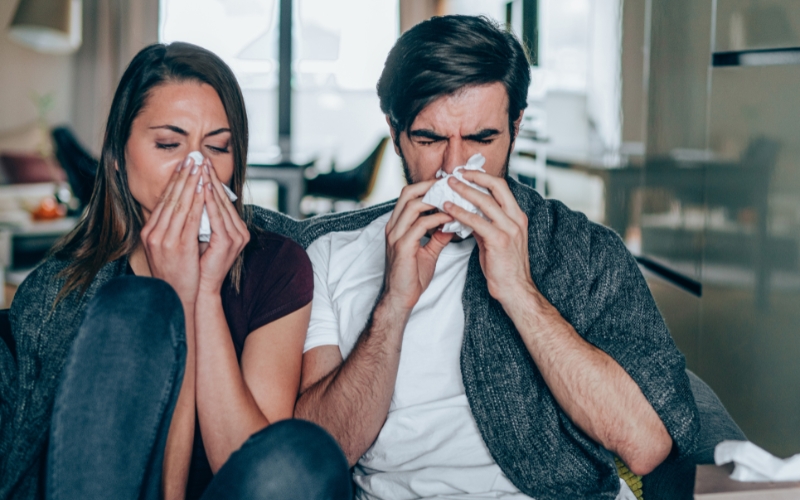The short answer to the question posed is yes. Influenza can strike at any time of year. While peak flu season typically occurs in winter, when people are gathered indoors, flu patterns have become less predictable since the COVID-19 pandemic. This has led to more flu cases outside the traditional October-to-May window.¹
What People Call the “Summer Flu” Might Not Be Influenza
When someone says they have the “summer flu,” it’s often not influenza at all. Instead, they may be dealing with another viral infection that causes flu-like symptoms.
Adenoviruses, mosquito-borne illnesses, and even the virus responsible for COVID-19 can cause similar symptoms. But the most common culprit behind what we call “summer flu” is usually a type of enterovirus.²
What Are Enteroviruses?
Enteroviruses are extremely common and can cause 10 to 15 million illnesses in the U.S. each year.³ Around half of those infected don’t show any symptoms.
These viruses tend to spike in the summer and early fall. With over 100 types of enteroviruses, most cause mild illnesses like the common cold or flu-like symptoms—hence the nickname “summer flu.”
One well-known enterovirus illness is hand-foot-and-mouth disease, especially in children. Symptoms include:
-
Fever
-
Mouth sores
-
Rash on hands and feet
In some cases, enteroviruses can lead to more serious complications, such as pneumonia or infections in the brain and heart muscle.
How Does the “Summer Flu” Spread?
Enteroviruses spread easily through:
-
Respiratory droplets (from coughing or sneezing)
-
The fecal-oral route (such as changing diapers or touching contaminated surfaces)³
Contaminated surfaces like doorknobs, phones, and elevator buttons can also transmit the virus.
How Long Is It Contagious?
People with enterovirus infections can be contagious for weeks, even if they never develop symptoms.
To help prevent spreading the virus:
-
Wash hands frequently
-
Disinfect high-touch surfaces
-
Avoid close contact with sick individuals
Common Summer Flu Symptoms
Most adults experience mild symptoms, like a cough or runny nose. Children, however, are more likely to experience full flu-like symptoms, including:
-
Fever
-
Chills
-
Sore throat and cough
-
Runny or stuffy nose
-
Muscle aches
-
Diarrhea or vomiting (more common in children)
-
Fatigue
How Synexis Can Help
Synexis is the only company that develops and deploys Dry Hydrogen Peroxide (DHP®) technology, which reduces both enveloped and non-enveloped viruses—including those responsible for summer flu symptoms—in the air and on surfaces.
DHP works continuously and automatically, 24/7/365, and is safe for use in occupied spaces. Our technology has been tested and proven effective in 13 peer-reviewed studies.
DHP is currently in use across:
-
Major healthcare systems
-
Dormitories and daycares
-
Cruise ships, casinos, and gyms
To speak with an IAQ expert from Synexis, fill out this form and we’ll be in touch as soon as possible.
And to learn more about Synexis, click here.
Sources










